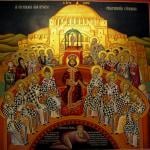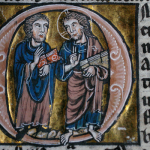
While Catholics have been told that the institutional church should be always reforming, many feel the need is greater now than it has been for decades. There have always been issues. The institutional church and its leaders has always been far from perfect, though the grace given to it means that their imperfections will not prevent the fulfillment of Christ’s purpose for the church (to be a vessel of salvation and change in the world). Dororthy Day understood this, which is why she said she could be disappointed with clergy, such as bishops, but she still felt there was some good done in the world in and through the church, especially those who accepted the grace given to them and acted on it, that is the saints; she let their example encourage her to be like them even if she didn’t want to be officially recognized as a saint. Nonetheless, it is clear, thanks to the various scandals emerging the last couple decades, Catholics have much work to do to clean up the institutional church, starting with the sexual abuse crisis and the way it has continued to be mishandled. When that scandal was first being reported to the public, I was a Catholic for only a few years, and I was not sure how to understand it let alone the proper response which should be had to deal with it. Years later, I have come to see the depth of the crisis, and with it, the need for Catholics to deal with it the way they deal with any other sin: confess it instead of hide it, do what they can to fix the areas in the institution which allow or encourages the abuse to continue instead of letting it fester, and to do penance, that is, to make proper restitution to those who have been harmed.
While the sexual abuse crisis is terrible, and can be and should be viewed as a concern on its own, to understand it, we must also see how it represents a greater problem which has developed in the church: the way the church has become complacent with its own evils. This is a concern which saints throughout time have spoken about, with St. Salvian the Presbyter being a favorite example of mine. Christians, when they do not live out holy lives, do not live out the teachings given to them, especially on an institutional level, will find non-Christians living out their lives in a far more moral fashion will not be interested in what Christians have to say.
While clericalism has often had a major role in the way the institutional church diverts from its own teachings, and so has been an issue in the sexual abuse crisis, it is not the only problem; we can see this in the way many involved in the sexual abuse crisis were religious (monk and nuns) and laity with positions of power and authority (such as teachers in Catholic schools). The institutional church is far more than the clergy, but the clergy represent the greatest authority in it. Because Catholics see the institutional church as a voice speaking truth to the world that the world needs to hear, they are willing to look away, to turn a blind eye to the crisis within the church itself. This has led many to think knowing the truth and speaking on it is more important than putting it into action; in doing so, Catholics who do this come extremely close to saying faith alone suffices.
The institutional church needs to do more than speak on the truth, it really needs to lead by example, and when it does not, its moral voice is greatly diminished. I have especially seen the disconnect between the words and deeds of the institutional church in relation to the way it deals with social justice: the words are great, but sadly, the actions of the church has often been lackluster at best; those who work for the church, for example, do not often receive all that the church says society should give workers: living wage, health care, and times of rest and heal. When the church says no one should be discriminated because of sexuality, nationality, or creed, once again, those working for the church, such as in schools, find the opposite happens. Many parishes, and indeed, cathedrals, have been known to abuse the homeless, while those who work in Catholic schools and universities have not been allowed the right to form unions and use those unions to make sure they work in fair working conditions.
As a result of the institutional church not acting on its own teachings, many Catholics find the church’s example justifies the way they deny those teachings when engaging politics. Due to such indifference, Catholics have been led to think social teachings are insignificant, and so find themselves embracing culture war concerns over and above official teachings of the church. This, once again, shows the crisis of the modern church, because we can see what this had led to: Catholics proclaiming themselves to be pro-life justifying the ways the political pro-life movement ignores the human dignity and rights of those who are born. For quite some time, the excuse has been that those concerns are secondary and will be dealt with after abortion. The reality has proven far different: even after getting what they want concerning abortion, they continue to ignore the dignity of all life and end up supporting and promoting politicians who show an indifference to life itself: how else, for example, can those who have call themselves pro-life show no concern for the homeless, the poor, the sick, the elderly, as, for example, happened with the COVID pandemic, or now is happening with the way Republicans are promoting policies which will lead to countless deaths. Now we hear “we are all going to die” as an excuse to ignore preventable death for the sake of financial gain. Of course, if we take that nihilistic response to its proper end, there will be no justification for the defense of any life at any stage of its existence and abortion should be seen as acceptable because, after all, we are all going to die. Why prevent it?
It seems that many Catholics treat only a few basic dogmatic decrees (such as on the Trinity, the incarnation, and various Marian doctrines), and a few (not all) sexual moral concerns, as what is important, and everything else can be questioned or ignored. What has happened? A big part of it is the way many Catholic teachings are not properly taught or explained in the pulpit. This is especially true in regards recent papal encyclicals. If a priest is indifferent and ignores what is being taught, their flock will likely become indifferent as well. They might not even have been properly made aware of what is being taught. This is why so many Catholics ignore the preferential option for the poor and Catholic teaching on the need to take care of the environment. But all recent popes have said otherwise. Their critics, and the ideologies of their critics have received far more attention and promotion in Catholic communities, Catholic media, and in many churches, than the teachings of the popes. And so, while people are right in saying catechesis is not the answer to the problems of the church, because there is the need to put the catechesis in action, there still needs to be catechetical reform so that those teachings which are being undermined by Catholic media and other such sources will be properly defended and explained to the faithful.
It is important for all Catholics, clergy and laity alike, to take in all the teachings of Christ and live them out. Faith without works is dead. It is also important for the institutional church to truly deal with the growing conflict within the church that is seen as the direct result of Catholic media and popular priests having overtaken the magisterium and the pope in the kind of influence they have on Catholics and the way many, if not most, understand Catholicism. It is quite clear to me, and it has been clear to me for some time, that Catholic media has helped pervert the Catholic message, and many problems in the church today is the result of the institutional church not seeing the threat coming from the media.
I do think there is hope that Pope Leo XIV, knowing some of these challenges, having sometimes dealt with them in the past, even if he has made mistakes when doing so, is in a position to be heard and help enact some of the changes which are needed. Right now, unlike Pope Francis, he has a voice which can be heard. He has not had as many people trying to undermine his work from day one of his papacy as Francis had. Some of the things I am hearing about now, such as his dealings with Opus Dei, suggest he will continue the reforms started under Pope Francis, but now, with more force. If so, perhaps, we might begin to see things change and change for the better. Pope Francis tried, and he did much good, but what he did can be said to only be a good start. Now let us hope that what has started begins to bring fruit, the fruit the institutional church needs so it and the faithful within can be the salt of the earth which God intended them to be.
* This Is Part LXIII Of My Personal (Informal) Reflections And Speculations Series
Stay in touch! Like A Little Bit of Nothing on Facebook.
If you liked what you read, please consider sharing it with your friends and family!
N.B.: While I read comments to moderate them, I rarely respond to them. If I don’t respond to your comment directly, don’t assume I am unthankful for it. I appreciate it. But I want readers to feel free to ask questions, and hopefully, dialogue with each other. I have shared what I wanted to say, though some responses will get a brief reply by me, or, if I find it interesting and something I can engage fully, as the foundation for another post. I have had many posts inspired or improved upon thanks to my readers.













